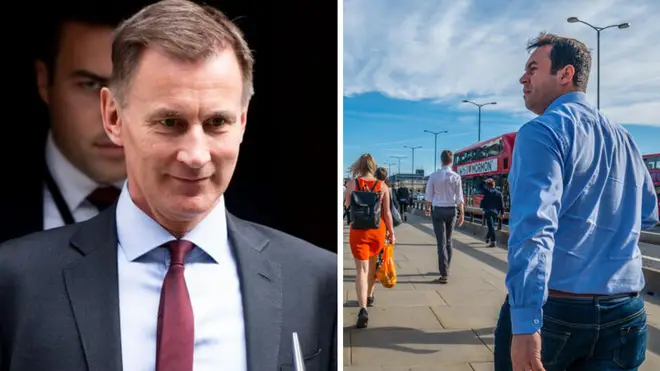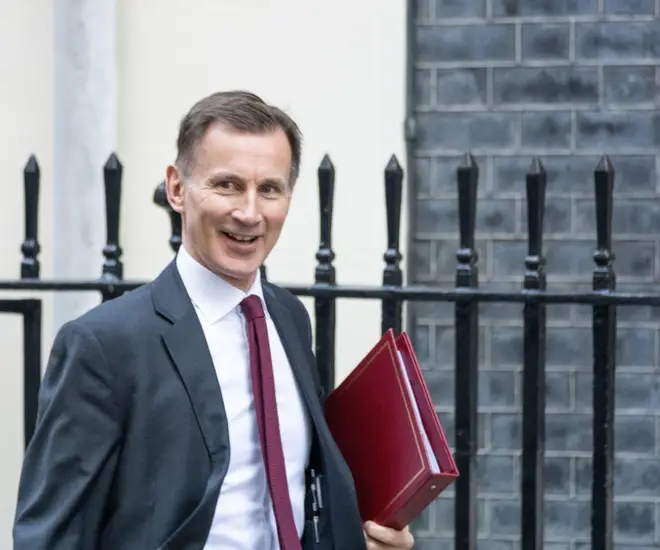
Iain Dale 7pm - 10pm
29 September 2023, 07:18

The current Parliament is likely to have ushered through the highest set of tax rises in over 70 years, according to a think tank.
The Institute for Fiscal Studies (IFS) found that taxes will likely have risen to 37% of national income by the time of the next general election in 2024.
That would come to a spike of roughly £3,500 more per household, although the increase would not be shared equally in reality.
This would be an increase not seen since 1948, the end of the hugely expensive Second World War and the start of the welfare state.
The IFS said that the tax rises in this Parliament were a sign of the UK's "permanent" move to a high-tax economy.

Tax breaks 'impossible' says Jeremy Hunt although flatline on inflation means 'plan is working'
Read more: Tax cuts 'virtually impossible' Chancellor tells LBC in blow to Tory right
They added that the big tax rises could not largely be put down to the pandemic, but were instead made necessary because of high spending and pressures on the NHS, among other factors.
Conservative MPs have been pushing for tax cuts, but Rishi Sunak and Chancellor Jeremy Hunt have consistently said that fiscal pressures mean the tax burden cannot be cut yet.
Mr Hunt told LBC's Andrew Marr last week that tax cuts were "virtually impossible", because of the high cost of the UKs' long-term debt.
But some observers think that Mr Hunt could announce some tax cuts ahead of the election next year in a bid to win over voters - possibly financed by scrapping HS2.

Caller believes that those who can afford it should pay more in taxes.
Ben Zaranko of the IFS said: "It is inconceivable that this Parliament will turn out to be anything other than a tax-raising one - and it looks nailed on to be the biggest tax-raising parliament since at least the Second World War," he said.
"This is not, for the most part, a direct consequence of the pandemic. Rather, it reflects decisions to increase Government spending, in part driven by demographic change, pressures on the health service, and some unwinding of austerity.
"It is likely that this Parliament will mark a decisive and permanent shift to a higher-tax economy."
Mark Franks, the director of welfare at the Nuffield Foundation, said there would be "strong pressure" in future to raise taxes even further to pay for increased demand on the NHS.
"Future governments must not only have a credible and robust strategy for the economy and the public finances, but should also be forthright and transparent about the difficult trade-offs they will face," he said.
Opposition parties slammed the government for the high tax rises.

Shadow chief secretary to the Treasury Darren Jones said: "Successive Tory governments have overseen 13 years of low growth and stagnant wages. Their response in the face of this bankrupt legacy is always to load their failure onto working people. And what are we getting back? Crumbling public services.
"Brits are working hard but getting clobbered with 25 Tory tax rises and a continuing Conservative premium on their household budgets."
Liberal Democrat Treasury spokesperson Sarah Olney said: "This Conservative Government crashed the economy and is making the public pay the price. This is the same party which promised not to raise people's taxes and is now taxing families through the nose.
"Despite this, ministers have given tax cuts to the big banks, failed to close loopholes in the windfall tax on oil and gas giants and wasted eye watering sums on dodgy PPE contracts."
A Treasury spokesperson said: "Despite needing to take the difficult decisions to restore public finances in the face of the dual shocks of the pandemic and Putin's illegal invasion of Ukraine, the latest data shows our tax burden will remain lower than any major European economy.
"Driving down inflation is the most effective tax cut we can deliver right now, which is why we are sticking to our plan to halve it, rather than making it worse by borrowing money to fund tax cuts.
"We have also taken 3 million people out of paying tax altogether since 2010 through raising personal thresholds, and the Chancellor has said he wants to lower the tax burden further - but has been clear that sound money must come first."